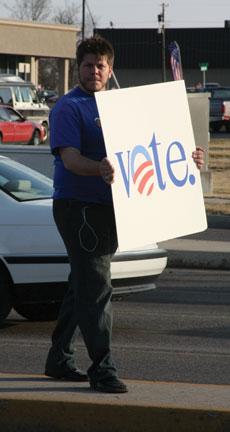Students question Southern’s political presence

Students question Southern’s political presence
After the Super Tuesday vote, students discussing political involvement questioned Missouri Southern’s role as a forum for political debate.
“So far all I’ve seen are Democrats on campus,” said John Helme, junior marketing major.
Richard Brown, sophomore political science major, attributes the lack of a Republican presence on campus to the fact that “higher education has always been more liberal.”
Another factor may be the lack of confidence in Republican candidates. Even Brown, a moderate Republican who voted for McCain, has some worries.
“I know McCain can beat Clinton, there are too many anti-Clinton voters.” Brown said. “But if Obama gets the Democratic bid it’ll be different. He is very popular and well liked, so he poses more of a threat.”
Adam Hancock, senior political science major, said he is a Republican but this year he is voting Democrat.
“Obama just has the most plausible fiscal plan for health care, education, and social security,” Hancock said. “And since the U.S. is discontent with the Republican Party it is inevitable that we will have a black man or woman president by the end of this year.”
But not everyone thinks this way.
“People are really just disappointed with the current administration,” said Dylan Slagle, senior political science major. “And the Republican candidates have done a lot to distance themselves from it.
“I think the involvement, discussion and the way the candidates promote themselves has been really good so far. Of the three front-runners, whoever we elect will really affect the way we live and how the government operates in a very positive way. We just can’t afford for them not to.”
Election information on campus was lacking.
“There are at least 100 bulletin boards on campus and I didn’t see any flyers or anything that said get out and vote in the primaries,” Helme said. “Not even one of my professors brought it up. Most of the people I’ve talked to didn’t even know they were supposed to vote Tuesday.”
Some students said organizations within the University hold some responsibility in educating students on politics.
“A lot of students stay here on campus and we get most of our information from flyers, posters, and emails,” said Lauren Bates, senior marketing major. “In my opinion right now there is no political presence on campus. Nobody’s even asked me who I’d vote for.”
Slagle said in general he thinks its good for the University to keep the student body informed and interested in current issues and the election is a very important current issue to him.
“If someone goes out to vote without any information on the candidates then their vote is not a positive one,” Slagle said. “You can’t cast your vote because you know a name or because your friend told you to. If you’re unsure about a candidate or the race in general then just don’t vote.”
Informed voters make the difference to Hancock.
“It’s not how many students vote, but how many educated students vote.” Hancock said.
Your donation will support the student journalists of Missouri Southern State University. Your contribution will allow us to purchase equipment and cover our annual website hosting costs.














